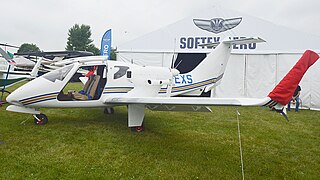
The Tecnam P92 Echo and Tecnam P92 Eaglet are Italian high-winged, light aircraft, designed by Luigi Pascale and built by Tecnam of Naples.
The Bede BD-7 was a light aircraft constructed in the United States in 1976. It shared the Bede BD-5's pusher propeller configuration but was considerably larger. The fuselage was all-metal, and the wings used the unique "panel-rib" wing construction pioneered on the Bede BD-4. Some sources state that the prototype flew in December 1976, but most suggest that it was never actually completed, much less flown.

The PZL M-17 "Duduś Kudłacz" was a Polish twin-boom pusher general aviation and trainer aircraft of 1977, which remained a prototype.

The Blue Yonder Twin Engine EZ Flyer is a Canadian designed and built, pusher configuration twin-engined, tandem two-seat, open cockpit aircraft provided as a completed aircraft or in kit form by Blue Yonder Aviation.

The Margański & Mysłowski EM-10 Bielik is a low-cost Polish military training aircraft prototype, built by Margański & Mysłowski Zakłady Lotnicze, and first flown on 4 June 2003. The single-engine aircraft has a composite fuselage with a light-alloy aft section, and the pressurized cockpit is fitted with ejection seats.

The Ruschmeyer R 90 is a four-seat light aircraft designed and produced in Germany in the late 1980s and early 1990s.

The Robin DR.200 is a family of French conventional landing gear single-engined light touring or training cabin monoplanes. Originally produced by Centre Est Aéronautique the company later changed its name to Avions Pierre Robin.

The Coavio DF 2000 is a single-engine, high-wing all-metal ultralight aircraft with side-by-side seating for two. Built in Italy, production began in 2004.

The TL Ultralight TL-132 Condor and TL-232 Condor Plus are single engine, highwing ultralight aircraft designed and built in the Czech Republic in the mid-1990s. They remain in production in 2010.

The Kestrel KL-1 is an American single-engined four-seat utility aircraft designed and built in the 1990s by the Kestrel Aircraft Company of Norman, Oklahoma.

The Ameur Altania was a single-engine light aircraft of pusher configuration with side-by-side seats for two and a V-tail, designed in France in the 1990s. Several prototypes were built and flown, including a 15 m span motorglider version; the final prototype was constructed from carbon composites rather than glass fibre. Another version, the UCA Carbon Bird has been built by Universal Composite Aviation after the bankruptcy of Ameur Aviation.

The Partenair Mystere is a Canadian two-seat, pusher configuration monoplane that was designed by Partenair Design of Saint-Jean-sur-Richelieu, Quebec and intended for amateur construction from kits.
The IAE VUT Marabou was built as a piloted test vehicle to develop autonomous control of unmanned aerial vehicles (UAVs) flying in civil airspace. Czech-designed and constructed, it first flew in April 2010.

The SGP M-222 Flamingo was an Austrian twin engine, four seat light aircraft, developed with a series of prototypes into the early 1960s. There was no series production.
The ViS Sprint is a pusher configuration, pod-and-boom two-seat ultralight, designed and built in Ukraine in the mid-2000s. It can serve as an agricultural spraying aircraft.
The Softeks V-24 Lastivka is a four-seat, twin pusher engined utility aircraft, designed and built in Ukraine in the 2010s for survey and transport work. The first prototype flew late in 2012.

The Softex-Aero V-24 is a proposed five place twin engined aircraft from Ukrainian-based Softex-Aero.

The ELA Aviation ELA 10 Eclipse is a Spanish, two-seat, enclosed autogyro, designed and built by ELA Aviación of Córdoba, Andalusia. It was introduced at the AERO Friedrichshafen airshow in 2014. The aircraft is supplied complete and ready-to-fly.
The Nova Coden is a Polish autogyro under development by Nova Sp. z.o.o. of Gdynia. Intended to be type certified, it is planned that the aircraft will be supplied complete and ready-to-fly.
The SkyCruiser Autogyro SkyCruiser is a series of Hungarian autogyros designed and produced by SkyCruiser Autogyro KFT of Inárcs. It was publicly introduced at the AERO Friedrichshafen airshow in 2014. The aircraft is supplied complete and ready-to-fly.















